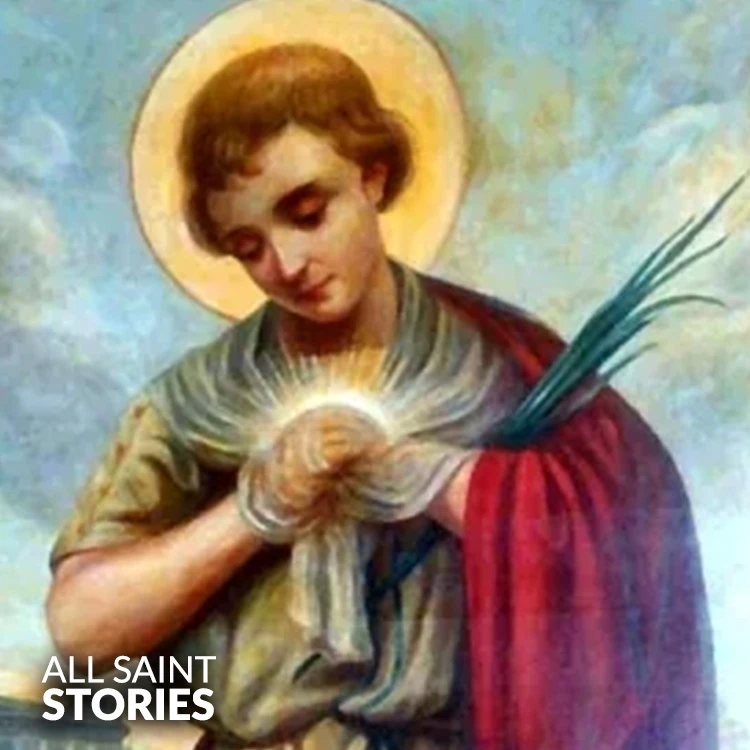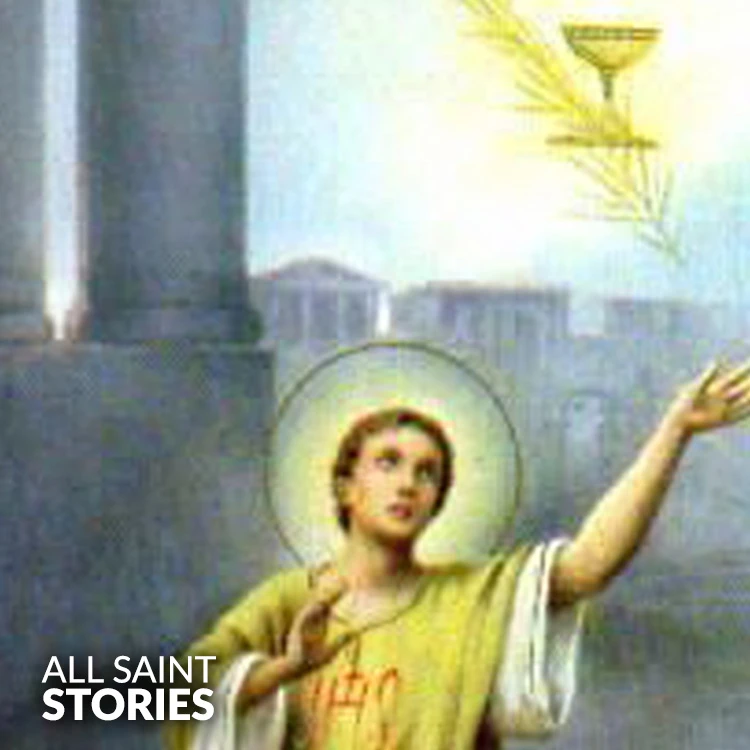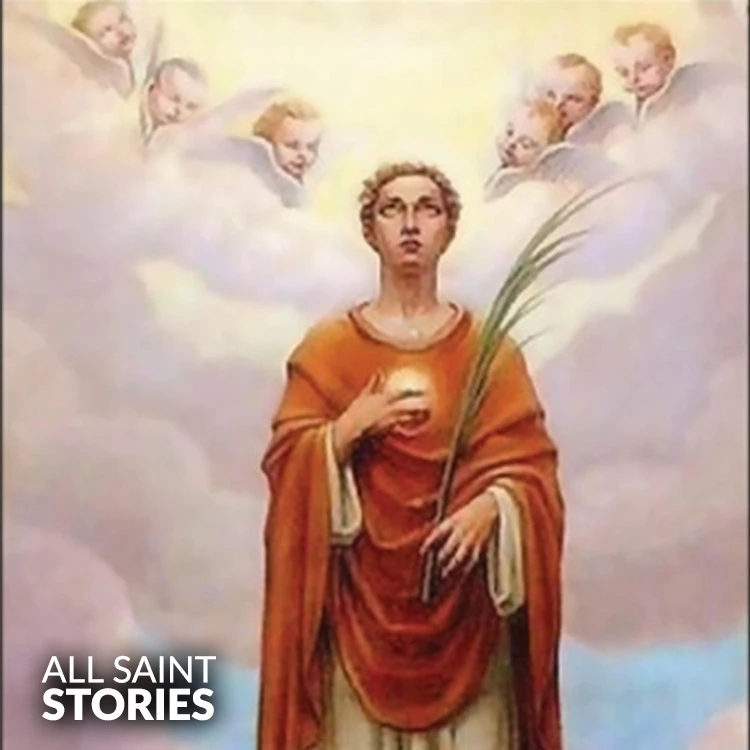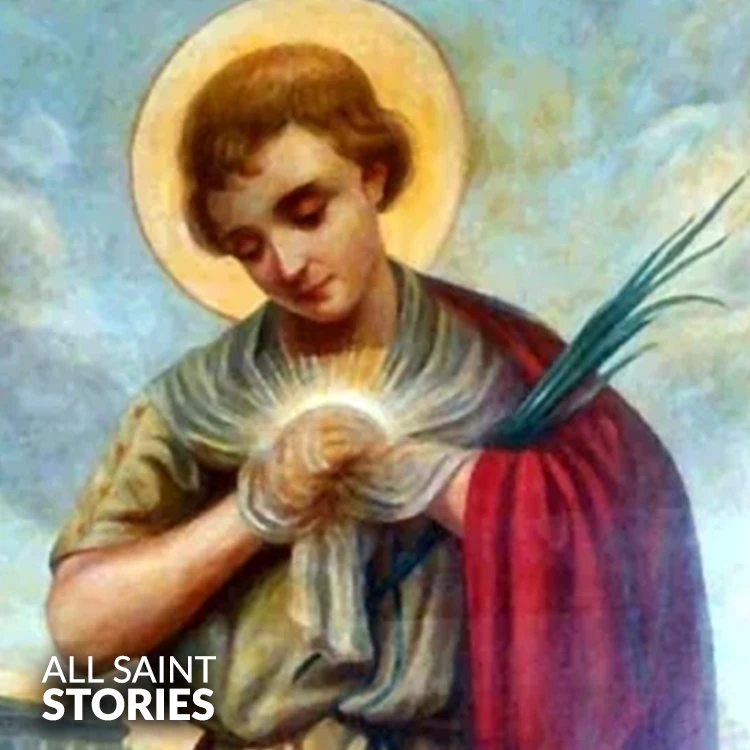Saint Tarcisius, faithful servant of Christ, You gave your life to protect the Holy Eucharist. Help us to cherish and honor the Blessed Sacrament with the same devotion and courage. Pray for us, that we may remain strong in our faith and live with true love for God. Amen.
ST. TARCISIUS
ST. TARCISIUS

Saint Tarcisius was a young Christian martyr who is remembered for his unwavering devotion to the Eucharist. While carrying the consecrated host to Christians in hiding, he was attacked and died protecting the sacred sacrament. He is honored as the patron saint of altar servers and is a symbol of selflessness and courage in the face of persecution.
Saint Tarcisius was a young Christian boy, believed to have lived during the 3rd century, under the Roman Empire, possibly during the papacies of Pope Saint Cornelius or Saint Sixtus II. Tarcisius is celebrated for his martyrdom, which occurred when he was entrusted with carrying the Eucharist to Christians who were unable to attend Mass due to the ongoing persecutions. Christians at the time were forbidden to gather publicly for worship, and many had to hide in secret locations to practice their faith.
Tarcisius, likely a server at one of these clandestine Masses, was chosen to carry the sacred Eucharist to fellow believers. On one of these journeys, as he was making his way through the streets, he encountered a group of pagan boys. They began to harass him, and when they saw that he was carrying something in a small case, they demanded to know what it was. Tarcisius, knowing the importance and sanctity of the Eucharist, refused to reveal the sacred contents. Rather than allowing the Eucharist to be desecrated, he chose to protect it with his life.
In the ensuing altercation, the boys became violent, beating him severely. Despite the brutal assault, Tarcisius continued to defend the Eucharist. Ultimately, he succumbed to his injuries and died a martyr. His death is considered an act of supreme devotion, as he chose to sacrifice his life rather than allow the sacred sacrament to fall into the hands of those who would desecrate it.
Saint Tarcisius is often depicted as a young boy, sometimes holding a ciborium (a vessel used to hold the Eucharist), a symbol of his role in the Church and his ultimate sacrifice. His courage and faith have made him a beloved figure in the Church, especially among altar servers, who look to him as a model of service and reverence for the Holy Eucharist. He is a reminder of the sanctity of the sacraments and the need to protect them from desecration.
His feast day, celebrated on August 15, honors not just his martyrdom, but also his devotion to the Church and his willingness to endure suffering in order to uphold the sacred. While details about his birth and exact death date are uncertain, his story has endured through the centuries, making him one of the most revered figures in Christian hagiography.
Video Not Found
The information on this website is compiled from various trusted sources. While we aim for accuracy, some details may be incomplete or contain discrepancies.
If you notice any errors or have additional information about this saint, please use the form on the left to share your suggestions. Your input helps us improve and maintain reliable content for everyone.
All submissions are reviewed carefully, and your personal details will remain confidential. Thank you for contributing to the accuracy and value of this resource.
Credits & Acknowledgments
- Anudina Visudhar (Malayalam) – Life of Saints for Everyday
by Msgr. Thomas Moothedan, M.A., D.D. - Saint Companions for Each Day
by A. J. M. Mausolfe & J. K. Mausolfe - US Catholic (Faith in Real Life) – Informational articles
- Wikipedia – General reference content and images
- Anastpaul.com – Saint images and reflections
- Pravachaka Sabdam (Malayalam) – Saint-related content and insights
We sincerely thank these authors and platforms for their valuable contributions. If we have unintentionally missed any attribution, please notify us, and we will make the correction promptly.
If you have any suggestion about ST. TARCISIUS
Your suggestion will help improve the information about this saint. Your details will not be disclosed anywhere.
© 2026 Copyright @ www.allsaintstories.com





 English
English
 Italian
Italian
 French
French
 Spanish
Spanish
 Malayalam
Malayalam
 Russian
Russian
 Korean
Korean
 Sinhala
Sinhala
 Japanese
Japanese
 Arabic
Arabic
 Portuguese
Portuguese
 Bantu
Bantu
 Greek
Greek
 German
German
 Dutch
Dutch
 Filipino
Filipino